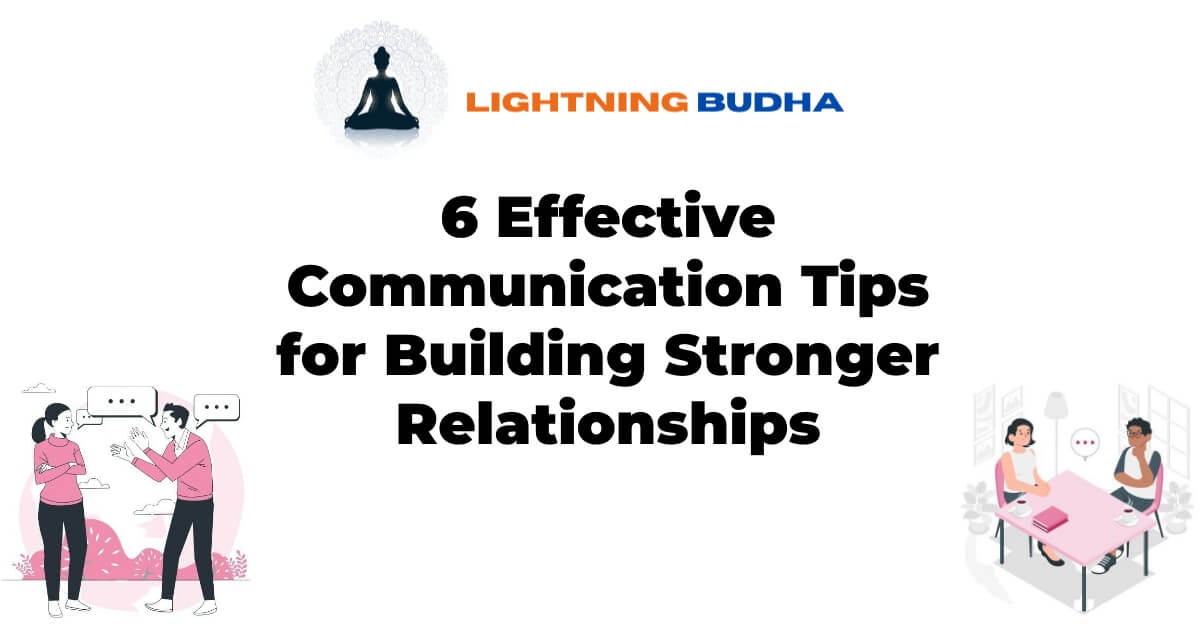Enhance your relationships with 6 effective communication tips. Build trust, understanding, and connection with these easy-to-implement strategies. Improve your personal and professional connections today
Effective communication lies at the heart of any successful relationship. Whether it’s with your partner, family, friends, or colleagues, the way we communicate can make or break the connections we have with others.
In this article, we will explore essential communication tips that can help you build stronger and more meaningful relationships.
6 Effective Communication Tips:
Learn how to communicate effectively with the help of these 6 priceless suggestions. Improve your ability to communicate with others, create better bonds with others, and promote understanding in both personal and professional interactions.

These practical tactics can equip you to handle discussions with confidence and make a good effect, from active listening to clear and concise expression. Start putting these communication suggestions into practise right away to find the door to satisfying and fruitful encounters.
By implementing these strategies, you can foster understanding, trust, and harmony in your interactions, leading to deeper connections and happier, more fulfilling relationships.
1. Active Listening:
One of the most fundamental aspects of effective communication is active listening. It involves giving your full attention to the person speaking, without interrupting or formulating responses in your mind. Practice active listening by maintaining eye contact, nodding to show understanding, and asking clarifying questions.

By truly listening, you demonstrate respect for the other person’s thoughts and feelings, and they, in turn, will feel valued and understood.
- Maintain Eye Contact: When you maintain eye contact, you signal your genuine interest and create a space for open dialogue.
- Reflect and Clarify: Repeat what you’ve heard and ask for clarification to ensure you truly understand the other person’s perspective.
2. Express Empathy:
Empathy is the ability to understand and share the emotions of another person. When someone expresses their thoughts or concerns, try to put yourself in their shoes and genuinely acknowledge their feelings. Respond with empathy by saying things like, “I can understand why you feel that way” or “It must be challenging for you.”

By showing empathy, you create a safe and supportive environment where open communication can thrive.
Validate Emotions: Acknowledge their feelings without judgment, showing that you care about their well-being.
3. Clear and Concise Communication:
Clear and concise communication is crucial for avoiding misunderstandings and confusion. Be mindful of your words and express yourself in a straightforward manner. Avoid using vague or ambiguous language that can lead to misinterpretation.

If necessary, ask for clarification from the other person to ensure mutual understanding. By being clear and concise, you create a solid foundation for effective communication and prevent unnecessary conflicts.
- Be Direct: Speak your thoughts clearly and directly, avoiding vague language that could lead to misunderstandings.
- Avoid Blame: Focus on the issue at hand instead of placing blame on the other person. This encourages a constructive conversation.
4. Use “I” Statements:
When expressing your feelings or concerns, use “I” statements instead of “you” statements. For example, say, “I feel hurt when this happens” instead of “You always make me feel hurt.” “I” statements focus on your own emotions and experiences, promoting open dialogue and reducing defensiveness in the other person.

This approach encourages a non-confrontational atmosphere where both parties can express themselves without feeling attacked.
5. Non-Verbal Communication:
Remember that communication is not just about words; non-verbal cues play a significant role as well. Pay attention to your body language, facial expressions, and tone of voice. Maintain an open and approachable posture, make eye contact, and use a warm and respectful tone.

Non-verbal communication can convey sincerity, empathy, and interest, reinforcing the message you want to convey and fostering stronger connections.
- Maintain Open Posture: Keep your body language open and inviting, showing that you are engaged in the conversation.
- Use Facial Expressions: Smile, nod, and use appropriate facial expressions to show your interest and support.
6. Practice Mindful Communication:
In today’s fast-paced world, it’s easy to fall into the habit of multitasking during conversations. However, this can hinder effective communication and make the other person feel unheard or unimportant. Practice mindful communication by giving your undivided attention to the person you’re speaking with.

Put away distractions, focus on the present moment, and engage fully in the conversation. By doing so, you show respect and create an environment of genuine connection.
- Avoid Interrupting: Allow the other person to finish speaking before you respond, showing respect for their thoughts.
- Listen with Intent: Rather than formulating your response while they’re speaking, focus on truly understanding their message.
How to communicate effectively (Linkedin)
Conclusion:
Building stronger relationships through effective communication is a lifelong journey. By incorporating these communication tips into your interactions, you can cultivate understanding, trust, and respect in your relationships. Remember to listen actively, express empathy, communicate clearly, use “I” statements, be mindful of non-verbal cues, and practice mindful communication.
By doing so, you will lay the groundwork for healthier, more meaningful connections, leading to greater happiness and fulfillment in your personal and professional life.
Just as a well-tended garden flourishes with care, relationships flourish when nurtured through mindful and skillful communication.. Whether it’s a heartfelt conversation or a simple exchange of words, every instance of communication has the potential to deepen your connections and enrich your relationships.
Other Interesting Post To Read:
Why Is Relationship Building Important in Leadership
The Foundations of a Strong Relationship: Communication, Trust, and Respect
Conflict Resolution Techniques for Healthy Disagreements in Relationships



[…] 6 Effective Communication Tips for Building Stronger Relationships […]
[…] 6 Effective Communication Tips for Building Stronger Relationships […]